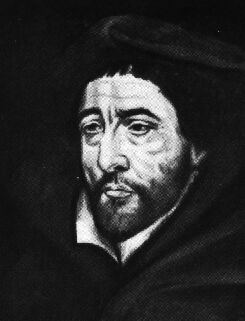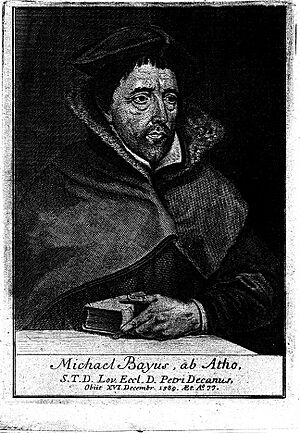Michael Baius facts for kids
Quick facts for kids
Michael Baius
|
|
|---|---|

Painting of Baius
|
|
| Born |
Michel De Bay
1513 Meslin-l'Évêque, Belgium
|
| Died | September 16, 1589 (aged 75–76) Leuven, Belgium
|
| Occupation | Theologian |
| Known for | Baianism |
Michael Baius (1513–16 September 1589) was a Belgian theologian. He developed a way of thinking known as Baianism.
Contents
Early Life and Education
Michael Baius was born as Michel De Bay in 1513. His family lived in Meslin L'Eveque, a place near Ath in Hainaut. His father, Jean de Bay, was a farmer.
Michel started his studies in humanities in Brugelette and Enghien. In 1533, he began studying philosophy at the Grand College het Varken at the University of Leuven. Two years later, in 1535, he also started studying theology at the Pope Adrian VI College.
He was a very bright student. In 1542, he became a priest. He was also chosen to be the director of the Standonck-College in Leuven.
Becoming a Professor
In 1544, Michel De Bay earned his doctorate in philosophy. He then became a teacher at the College het Varken. The next year, in 1549, he was made a professor of philosophy.
In 1550, De Bay also got his license in theology. He became the president of College Adrian. He even filled in for the professor of Holy Scripture, who was away at the Council of Trent. From February to August 1553, he was the head of the university, known as the rector. Baius became very good friends with another scholar named Jean Hessels.
New Ideas and Challenges
While two important professors, Chancellor Ruard Tapper and Josse Ravesteyn, were at the Council of Trent, Baius and Hessels started teaching new ideas. They believed that Catholic scholars relied too much on the teachings of older thinkers called Scholastics.
Baius and Hessels thought it would be better to focus more on the Bible and the writings of early Christian leaders. They felt this would make their arguments stronger. They especially liked the ideas of St. Cyprian, St. Jerome, and St. Augustine.
When Tapper returned from Trent in 1552, he asked Cardinal de Granvelle, the archbishop of Mechelen, to help. Granvelle managed to calm things down for a while. However, De Bay's ideas were very popular with theology students, who spread them further.
Many people disagreed with these new ideas. Around 1558, Cardinal Antoine Perrenot de Granvelle and Viglius tried to convince De Bay to change some of his views, but they were not successful. In 1560, a group called the Franciscans asked the Sorbonne University to look into his statements. The Sorbonne then said 18 of his statements were wrong.
Baius wrote a response, but it is now lost. The disagreement grew even stronger. Pope Pius IV, through Cardinal Granvelle, told both Baius and the Franciscans to stop arguing. However, the Pope did not make a final decision on the ideas themselves.
Role at the Council of Trent
In 1563, Baius was chosen to represent Belgium at the Council of Trent. However, he arrived too late to play a big part in the discussions. Some people at the Council did not want him there. He was only allowed to attend as a theologian for the King of Spain. The Council leaders were quite suspicious of his views.
Just before going to Trent, Baius had published his first writings. The ideas in these writings were not part of the Council's main topics, so there was no public discussion about them. Still, it was clear that the Council Fathers did not like Baius' and Hessels' views. Only the King of Spain's influence kept them from being officially condemned.
Later Career and Condemnations
Baius returned to Leuven in 1564 and published more writings that same year. In Leuven, he became well-known for leading a movement against the old Scholastic way of thinking.
Baius often used the ideas of Augustine of Hippo. However, some of his interpretations of Augustine's teachings, especially about God's grace and human free will, caused problems. His views were sometimes seen as similar to Pelagianism, which was considered incorrect by the Church.
Ravestein, who had become the new chancellor, told Rome about the issues and asked for a clear decision. On October 1, 1567, Pope Pius V issued a special document called a papal bull named Ex omnibus afflictionibus. This document condemned seventy-nine statements from Baius' writings. However, the bull did not mention Baius by name.
Baius accepted this decision. But some things he and his supporters said later led to the condemnation being repeated in 1579 by Pope Gregory XIII. Even so, Baius was allowed to keep his professorship. He even became the chancellor of Leuven in 1575.
Death and Legacy
Michael Baius died on September 16, 1589, still holding his positions as professor and chancellor.
His writings are described as a mix of Catholic beliefs and ideas that leaned towards Protestantism. His main works were collected and published in Cologne in 1696, though some larger writings were left out. A book about Baius and his works, Michael Baius und die Grundlegung des Jansenismus, was published in 1867 by Linsenmann.
Key Beliefs
Baius based his theological ideas on the Holy Scripture (the Bible) and the writings of the early Church Fathers, especially Augustine of Hippo. However, he introduced some different ways of using scholarly terms.
His teachings, later called Baianism, focused on:
- Sin
- Free will
- God's grace
He also argued against the idea of papal infallibility, saying that the power of bishops came directly from God, not just from the Pope.
Some historians, like Joseph Sollier, see Baius as someone who influenced later theological movements, such as Jansenism and the thinkers at Port-Royal, like Blaise Pascal.
 | Valerie Thomas |
 | Frederick McKinley Jones |
 | George Edward Alcorn Jr. |
 | Thomas Mensah |


